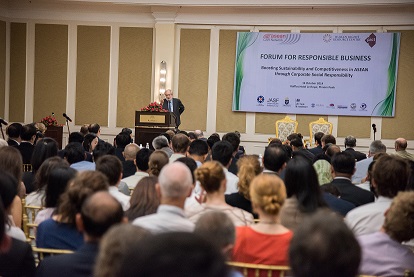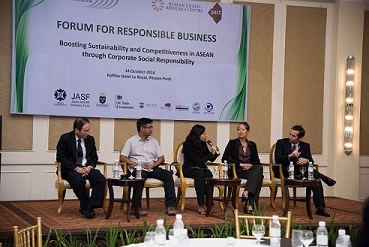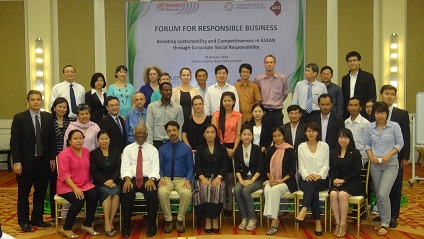ASEAN CSR Network's 'Forum for Responsible Business' highlights the importance of CSR in building a sustainable and inclusive ASEAN Community
Phnom Penh, Cambodia, 14 October - The ASEAN CSR Network (ACN) held its Forum for Responsible Business’ at the Raffles Hotel Le Royal in Phnom Penh, Cambodia on 14 October 2014. With more than 300 participants from the business and NGO communities in attendance, keynote speaker Lord (David) Puttnam, the UK Prime Minister’s Trade Envoy for Burma, Cambodia, Laos and Vietnam, shared his thoughts on the Forum’s theme – “Boosting Sustainability and Competitiveness in ASEAN through Corporate Social Responsibility (CSR)”.

Lord Puttnam, who is widely recognized in Cambodia as the award-winning producer of ‘The Killing Fields’, started off his address with his thoughts on the concept of ‘fairness’, relating it to lessons from his father and experiences as a film-maker and businessman. He also touched on the importance of investing in human capital and the primary ‘duty of care’ that each individual and business must adhere to. He ended his remarks by emphasizing the value of inclusiveness and equitability when harnessing Cambodia and ASEAN growth potential.
The event was organized in cooperation with Pact and the Human Rights Resource Centre (HRRC) for ASEAN, and is part of the “Succeeding through Doing Good Business” series of events that were organized in Phnom Penh in 2014. Supporters of the Forum included the ASEAN Foundation, the ASEAN-Japan Solidarity Fund, the Government of Sweden through its embassy in Bangkok, the British Embassy in Cambodia, and the UK Trade and Investment.
ACN Chair Ms. Yanti Triwadiantini delivered the welcoming remarks and shared that “while ASEAN integration presents many opportunities for shared economic growth, there will also be a need to ensure that the growth we achieve is equitable, inclusive, and sustainable.” In simple terms, she continued, “there is a need to ensure that ASEAN’s growth benefits all people, especially the vulnerable and the poor”.
The ASEAN Community integration blueprint has identified the promotion of CSR as a key component for sustainable socio-economic development. It also highlights the need to support capacity-building efforts in Cambodia, Laos, Myanmar and Vietnam on how to adopt international standards on CSR. This is a mandate that the ACN has accepted as part of its mission “to mainstream responsible business practices in support of inclusive, equitable and sustainable socio-economic development in ASEAN.”
And with the target date for ASEAN community integration, just around the corner, there is a need to ramp up efforts and look beyond 2015. Mr. Thomas Thomas, CEO of ACN, shared about the ‘ASEAN CSR Vision 2020’, a program of the ASEAN CSR Network to facilitate dialogue, capacity-building and collective action on issues related to CSR. ACN has a vision of establishing “a responsible business community that makes ASEAN a better place to live for all.”
In the Forum’s second session, distinguished speakers shared examples and best practices on how CSR can contribute to a company’s competitiveness and sustainability. This included Mr. Tanawong Areeratchakul, the Vice-President for Corporate Administration at Siam Cement Group (SCG), Ms. Mona Tep, the Head of Human Resources and Administration at Dewhirst, Mr. Obaidur Rahman, the Technical Adviser for Education for Youth Empowerment (EYE) and CSR at Save the Children, and Mr. Carlo Figa Talamanca, the CEO of Sustainable Green Fuel Enterprise (SGFE). The session was moderated by Michelle Staggs Kelsall, the Deputy Director of the Human Rights Resource Centre.

The Forum was followed by a workshop facilitated by Mr. Rajesh Chhabara of CSRWorks International, a Singapore-based sustainability advisory firm. Mr. Chhabara shared with participants on how to get started in adopting and implementing internationally-accepted principles and standards on CSR, such as the UN Global Compact Ten Principles, the ISO 26000 guidance standard on social responsibility and the Global Reporting Initiative sustainability reporting framework.

